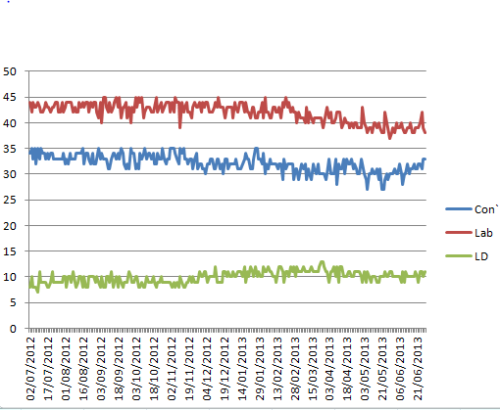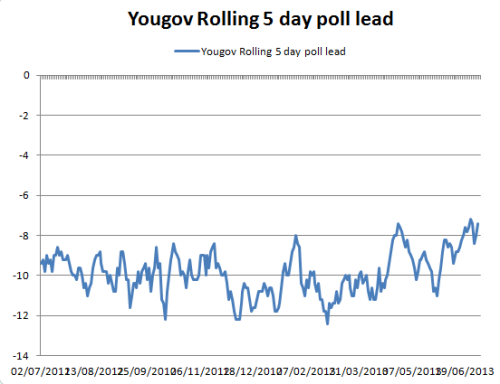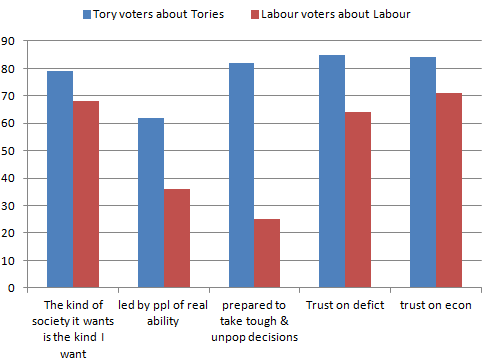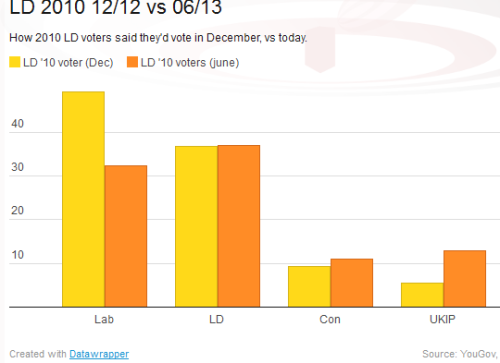I am not a doom monger. Neither do I wish to mong fear, panic, or scares. So when the Editor of this site asked me to write about Labour’s recent polling dip, I wondered how best to approach the subject. After all, read a great deal into a poll dip and you can sound uncomfortably like you’re rubbing your hands with glee. Dismiss one, and you are complacent.
Has there been a decline in out poll lead in the last six months or so? Yes. How much does this matter? Well, that depends on your judgement of future political risks.
Rather than tell you what the polls ‘mean’ therefore, I just want to try to set out what’s happened, suggest some reasons to be both cheerful and fearful, and let you make your own mind up about which are most convincing.
A narrowing gap?
So what’s been happening? It’s pretty clear that since December last year, the polls have seen a distinct narrowing of Labour’s lead. If we look at Yougov polls for the last year, you see that Labour was generally in the mid to low forties, but has declined since late January
As you can see above, both Labour and the Conservatives have declined, mostly due to the rise of UKIP, though the LibDems do appear to have recovered slightly from their nadir.
However, this decline in Labour’s poll share hasn’t had as significant decline on Labour’s poll lead.
If we take a rolling 5 day average of Labour’s poll lead with Yougov over the last year, it looks like this:
As you can see, in that last four months or so, there’s been a shift from a Labour poll lead of around eleven points to one of about eight points in the very latest polls. That’s a noticeable shift, but it’s certainly not earthshattering, nor is it particularly out of line with the sorts of leads Labour were registering in July last year.
So Labour’s absolute share of the vote has fallen, but as the Conservative share of the vote has fallen too, Labour still scores respectable leads.
So should this make us nervous? This is where your weighting of risks comes into play.
Some fear that the Labour lead isn’t solid.
If we take this Saturday’s Yougov internals, you can see that Labour voters are much less convinced by Labour than Conservative voters are convinced by the Tories. The chart below compares what Tory voters say about the Tory party with what Labour voters say about Labour
This higher level of “Labour doubt” reaches into some core issues. So when asked who they trust more to run the economy, 92% of Tories say Cameron and Osborne, whole 70% of Labour voters say Miliband and Balls.
However, what does unite Labour voters is dislike of the government. 89% of Labour voters don’t approve of the Government record. 85% say that George Osborne is doing a bad job as Chancellor. 87% say David Cameron is doing a bad job as PM.
So, again, the question comes back to a judgement. Do you think that dislike of the government is enough to get doubtful Labour voters to the polls in 2015?
Next, there’s the question of where UKIP voters will go.
Current UKIP voters are strongly dissatisfied with the government, giving approval rating for Government policy and minister that are almost as bad as that given by Labour voters. Yet when asked who they think are better between Labour’s team and the Tories on key issues, a big plurality choose the Tories over Labour, though even more don’t know or say neither are any good. Are those voters likely to stay UKIP, or will they trickle reluctantly back to the ‘main’ parties as the election nears.
Speaking of UKIP, it’s clear they have taken a fair wedge of support from Labour. But who those people are is quite interesting. There’s been some softening of Labour’s share of the vote among 2010 LibDem voters. Now you have to be careful with small samples, but recently Labour seems to be getting just over 30% of 2010 Lib Dem voters. That’s down considerable on a period a few months ago when Labour were getting almost half of 2010 Lib Dems.
The big gainers? UKIP. For political types, going Lib Dem to Labour to UKIP seems an odd political journey, but for voters who think that politics is broken and needs a kicking, it might make a great deal of sense.
So should Labour worry?
Well, as I said at the start, I don’t want to either fearmonger or seem complacent. So here’s three reasons to be cheerful or fearful.
Reasons to be Cheerful
- Labour’s poll numbers have very rarely gone below 38 with YouGov. If that’s really a floor for Labour support, then it puts Labour in a strong position. Even on their best days, the Tories have rarely gone above 40%.
- Since the May Local elections, which were “whelming” – neither overwhelming or underwhelming – Labour has been scoring some impressive results in local by-elections in key seats. This has been driven often by strong UKIP performances.
- Labour’s softening vote share hasn’t seen any transfer of support to the Conservatives. The Tories are saying little to Labour voters that is making them think again. For the Tories to win in 2015, they need to gain new support, not just retain the old (and they’re not even doing that).
Reasons to be fearful
- Labour’s internals on both policy and people are much weaker than the Tories. It’s possible that a significant proportion of people who say they’ll vote Labour now will have doubts come the Election campaign. There’s no inevitability to this, but it’s a concern.
- Historically, Labour’s lead is low for an opposition party heading for election victory. Again, there’s no set rule, and every election is different (we haven’t had many coalitions to compare with!) but most election winning parties establish bigger leads at some point.
- Just looking at uniform swing won’t be enough. In lots of key marginals, new Tory MPs will be defending their seats for the first time. This usually leads to an ‘incumbency boost’ which could mean Tory MPs hanging on in marginal seats despite a national swing that ‘should be enough’ to hand labour victory. Simply looking at a seats calculator might be way too over-optimistic.








More from LabourList
Delivering in Government: your weekly round up of good news Labour stories
‘Forgotten fathers: pipefitters, plumbers and the paternity pay gap’
‘How can Britain build peace for Palestinians without owning its own past?’